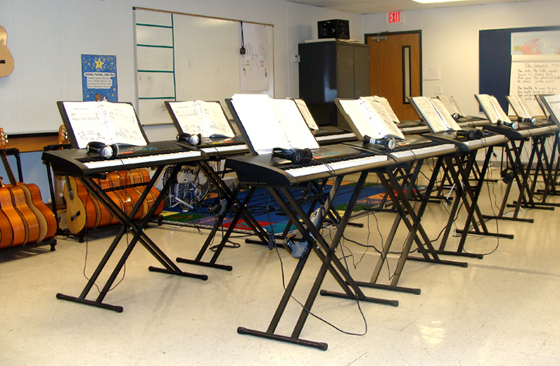Six-year-old Pride College Prep student Ferdinand Carter knows how to play 35 songs on his classroom’s keyboard, and he can read the sheet music, too.
Ferdinand and nearly 40 of his kindergarten classmates have learned to play and read music through the school’s music education program, which uses the national nonprofit music instruction system Music and the Brain, and the tutelage of a musician-turned-teacher, Nathan Money.
Money’s an alumnus of a local artist fellowship program, Artist Corps, which puts practicing musicians in public school classrooms. The program has placed artists in ten New Orleans schools in the last three years, and fellows will be able to get teaching certifications from the program starting this summer.
Most of Money’s kids didn’t have music knowledge before starting the class, he said. The point of the program isn’t to get students to master all the songs in their music books, though many of them have. The point is to teach them basic music concepts. Learning music also helps them in other areas, he said.
“It really helps in the direction of literacy, for one, because they’re decoding, just like they do with words,” Money said.
The program gets more complicated as kids move through it, first starting with right-hand only, short pieces, and eventually moving to two-handed, longer pieces. Students learn to read and play music through singing, movement, clapping, and music games. Learning music in this way is “a really good foundation” for future musicianship, Money said.
It’s that foundation that groups such as Artist Corps are focused on building. Schools need to be creating music curricula for younger students, as well as middle and high school students, Sonya Robinson, the organization’s director said.
“Some of our middle school and high school programs were suffering because kids got to middle school or high school and had never picked up a horn, and had never played music,” Robinson said.
Artist Corps helps schools build new music programs by partnering with them to put a musician fellow in the classroom, at a reduced cost to the school, for two years. The program’s fellows range in age and experience from recent college graduates, such as Money, to Grammy-award-winning artists, such as bassist David Pulphus.
After the two-year period, the school commits to hire a full-time teacher at full cost, on its own. The school often ends up hiring the fellow, Robinson said.
Money, who has been at Pride for three years, was instrumental in getting the Music and the Brain program, school director Michael Richard said. Money also led efforts to partner with a guitar instruction program aimed at young kids, Little Kids Rock.
Music and the Brain donated 30 keyboards to Pride, and Little Kids Rock footed the bill for another set of acoustic guitars for Pride’s third and fourth grade students.
Richard hooked up with Artist Corps because he wanted Pride to have a strong music education program from the beginning, and because it was inexpensive, he said. The school will add another music instructor next year, in addition to the position Money holds now, and eventually the school hopes to have jazz and brass bands.
Pride’s parents, such as Delcena Francis, the grandmother of six-year-old Tariq Wheeler, say that their students enjoy the program. “They should do this with all the schools because it helps them,” she said. “A lot of them are really reading the notes.”



